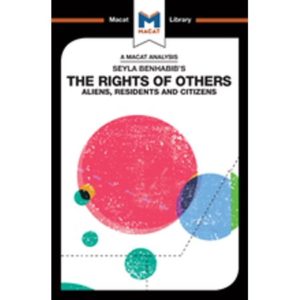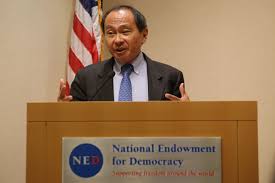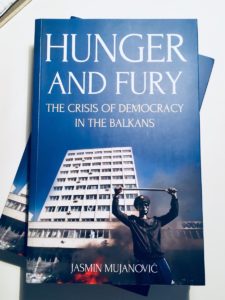Forced migration has reached unprecedented levels around the world. While unique migration crises’ geographic origins range from South America to the Middle East, each crisis shares a common root cause—the absence or collapse of democratic governance. Managing through these crises requires addressing underlying governance issues, the International Republican Institute (IRI) observes.
The global refugee crisis presents a profound challenge to democratic governance, according to Seyla Benhabib (above), professor of political theory at Yale University.
While liberal democracies have an obligation to respect the rights of refugees and migrants, they must also cope with exclusionary attitudes domestically, where nationalistic movements and anti-immigration groups have been mobilizing, she said, delivering the W. Michael Blumenthal Lectures, named for the founding director of Berlin’s Jewish Museum.
 A transnational strategy is vitally important for coalition-building to counter populism, according to Benhabib, the author of The Rights of Others: unless we integrate the migrants and refugee populations, the boundaries of the demos will be re-established by a xenophobic and cruel discourse of exclusivist and ethnocentric nationalism.
A transnational strategy is vitally important for coalition-building to counter populism, according to Benhabib, the author of The Rights of Others: unless we integrate the migrants and refugee populations, the boundaries of the demos will be re-established by a xenophobic and cruel discourse of exclusivist and ethnocentric nationalism.
“The rights of foreigners and aliens, whether they be refugees or guest workers, asylum seekers or adventurers, indicates the threshold, the boundary, at the site of which identity of the ‘we, the people’ is defined and renegotiated, bounded and unraveled, circumscribed or rendered fluid,” she argues in The Claims of Culture.
VIP card of citizenship
The global refugee crisis and the flight of persecuted millions on a scale not seen since World War II was a byproduct of the Islamic State’s emergence, notes AP’s Tamer Fakahany.
Mobility challenges democratic principles that rely on the concept of nation-states as “containers” with an assumed congruence of territorial, social and political space, Freiburg University’s If migrants are exposed to democratic principles and freedoms even without the VIP card of citizenship, they could have the real potential to become global “agents of democratization,” he writes for the Conversation.
 The rapid rise in migration produced cultural backlash and an anti-immigrant feeling that was exploited by “a lot of pretty opportunistic politicians who saw this as a big opportunity to mobilize new sources of support for themselves,” said Stanford’s Francis Fukuyama, a board member of the National Endowment for Democracy.
The rapid rise in migration produced cultural backlash and an anti-immigrant feeling that was exploited by “a lot of pretty opportunistic politicians who saw this as a big opportunity to mobilize new sources of support for themselves,” said Stanford’s Francis Fukuyama, a board member of the National Endowment for Democracy.
The security of Western democracies depends on welcoming displaced people, not deporting or demonizing them, argues former UK foreign minister David Miliband. It is a test of character that determines whether we genuinely adhere to liberal democratic values, he said in a TED Talk.
The politicization of a once relatively non-partisan issue is troubling, said Anne C. Richard, the Sol M. Linowitz Professor of International Affairs, and former U.S. Assistant Secretary of State for Population, Refugees and Migration.
“I have traveled the world to learn more about crises, pledge assistance, speak out on the need to do more for refugees, and negotiate with other governments and international organizations in an attempt to get better treatment of refugees and other conflict victims,” she recently told Hamilton College. “This meant spending time on the edges of war zones and meeting people from prime ministers, royalty and celebrities to poor people who have lost everything.”
![]() Borders, Migration, and the Nation is the theme of the new issue of Democracy and Society, writes Jennifer Raymond Dresden, Ph.D., the Associate Director of Georgetown’s Democracy & Governance Program.
Borders, Migration, and the Nation is the theme of the new issue of Democracy and Society, writes Jennifer Raymond Dresden, Ph.D., the Associate Director of Georgetown’s Democracy & Governance Program.
The boundaries of Arab states are famously misshapen, too small for the liking of Arab nationalists and pan-Islamist ideologues and too big to accommodate the national aspirations of stateless Kurds, Berbers, and Palestinians. This mismatch between national identity and state borders hindered the effectiveness and responsiveness of political institutions, writes Ariel I. Ahram of the Virginia Tech School of Public & International Affairs.
 Separatists—those looking to build new borders—are likely to be a key force undermining Middle Eastern stability for the foreseeable future, adds Ahram, a specialist on questions of governance, authoritarianism, and stability, drawing on his recent book Break All the Borders: Separatism and the Reshaping of the Middle East.
Separatists—those looking to build new borders—are likely to be a key force undermining Middle Eastern stability for the foreseeable future, adds Ahram, a specialist on questions of governance, authoritarianism, and stability, drawing on his recent book Break All the Borders: Separatism and the Reshaping of the Middle East.
The issue also features articles on The Development of Uyghur Ethnic Nationalism and the Transition of Xinjiang Policies by Joe Cho-Han Hsiung, and The Venezuelan Crisis and its Regional Impact: Transforming Challenges into Opportunities for Latin America, by Anderson Gómez, Lina Hernández and Roddy Enrique Rodríguez.
 A look at the democratic backsliding of Eastern European members of the EU would serve democracy theorists and observers well, Drake Long writes in a review of Jasmin Mujanovic’s Hunger and Fury: The Crisis of Democracy in the Balkans (Oxford University Press, 2018). Without sustained civil society, an enduring democracy with institutional protections will not take hold, and right now civil society is not being respected in the Balkans.
A look at the democratic backsliding of Eastern European members of the EU would serve democracy theorists and observers well, Drake Long writes in a review of Jasmin Mujanovic’s Hunger and Fury: The Crisis of Democracy in the Balkans (Oxford University Press, 2018). Without sustained civil society, an enduring democracy with institutional protections will not take hold, and right now civil society is not being respected in the Balkans.
Democracy and Society is currently accepting papers for its next issue dedicated to the theme of Resistance and Retaliation. Please review the call for papers and consider submitting an article.
Health and other service providers in Colombia are being pushed to the breaking point as they address Venezuelans with complex health cases, as well as overcrowded and under-staffed schools, notes a recent report from IRI, a core partner of the National Endowment for Democracy, that draws lessons from Colombia to show how to deal successfully with migrant crises.

IRI
The humanitarian crisis in Venezuela has driven 4.6 million people to Colombia and other countries, IRI adds. The shock of this unprecedented migration inflow, combined with Colombia’s own internal pressures, threatens to destabilize the country. On December 3, IRI will host an event with the Colombian Embassy to learn from the governments on the frontlines of this crisis. Speakers include Ambassador Carlos Vecchio, Ambassador of the Interim Government of Venezuela to the United States and Felipe Muñoz, Advisor to the President of Colombia for the Colombia-Venezuela Border. RSVP







